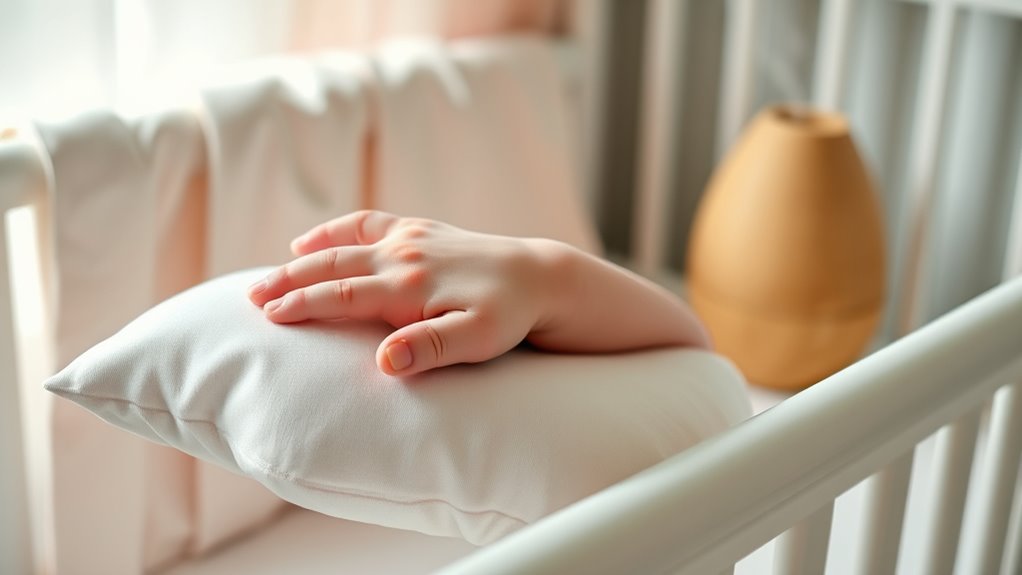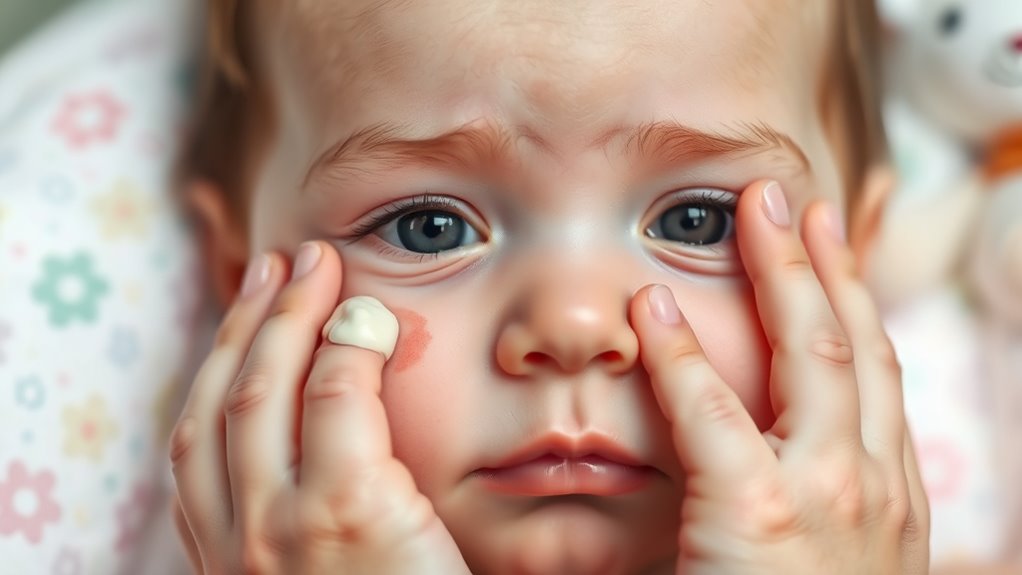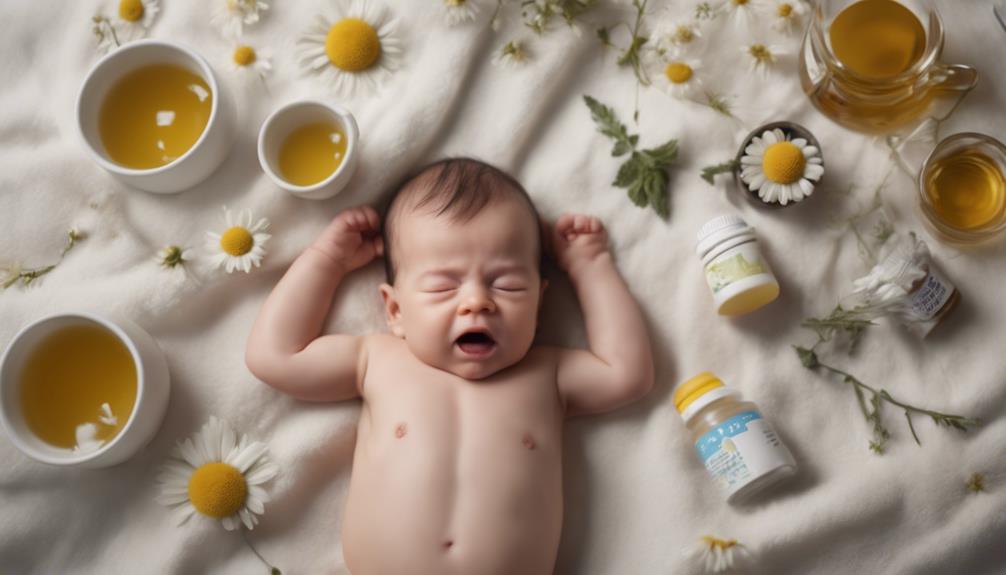To soothe your baby’s eczema, opt for gentle, natural remedies like chilled teething rings and clean, cold washcloths to reduce inflammation and calm irritation. Use fragrance-free wipes and moisturizers to lock in hydration without irritating sensitive skin. Frequent diaper changes and allowing your baby some diaper-free time help prevent flare-ups. Trimming nails and avoiding harsh soaps also protect delicate skin. Discover more simple strategies to help your little one feel comfortable and heal faster.
Key Takeaways
- Use gentle, fragrance-free moisturizers immediately after baths to lock in hydration and soothe irritated skin.
- Apply cool, damp washcloths or teething rings to reduce gum inflammation and overall discomfort.
- Change diapers frequently and use zinc oxide barrier ointments to prevent and heal diaper rash flare-ups.
- Avoid harsh wipes; opt for plain water or fragrance-free wipes to minimize skin irritation.
- Keep nails trimmed and encourage gentle skin care routines to prevent scratching and further eczema irritation.

If your baby is dealing with eczema, you know how frustrating and uncomfortable it can be for both of you. Scratching, redness, and irritation make every day a challenge. While eczema isn’t caused by teething, you might notice your little one fussing more during teething phases, which can seem to worsen their skin issues. Finding effective soothing remedies is essential, and understanding how to manage common discomforts like teething and diaper rash can help you create a calmer environment for your baby.
When it comes to teething remedies, many parents turn to natural options that soothe both sore gums and skin irritation. Cold teething rings or a clean, chilled washcloth can provide relief and reduce inflammation, helping your baby feel more comfortable. Some parents find that gentle gum massages or teething gels with natural ingredients can ease discomfort without exposing your baby to harsh chemicals. Remember, though, that these remedies won’t directly treat eczema, but reducing overall discomfort can help your baby relax and scratch less, preventing further skin irritation. Local ingredients used in certain remedies can also promote healing and soothe irritated skin.
Diaper rash treatments are also essential in managing eczema flare-ups because the diaper area is prone to irritation and can exacerbate existing skin issues. To keep your baby’s skin healthy, change diapers frequently and use a barrier ointment containing zinc oxide to protect against moisture and irritants. When an eczema flare occurs in the diaper area, opt for gentle, fragrance-free wipes and plain water for cleaning instead of harsh wipes with alcohol or fragrances. Let the skin breathe by giving your baby diaper-free time when possible, and always pat dry instead of rubbing. Using a humidifier in the nursery can help maintain skin hydration, which is indispensable for eczema management.
Beyond these specific remedies, maintaining a gentle skincare routine is key. Use lukewarm water for baths and avoid over-washing, which strips natural oils from your baby’s skin. Choose fragrance-free, dye-free moisturizers designed for sensitive skin and apply them immediately after baths to lock in moisture. Keeping your baby’s nails trimmed can also prevent scratching that worsens eczema.
While there’s no instant cure for eczema, combining these soothing strategies—like effective teething remedies and proper diaper rash treatments—can ease your baby’s discomfort and help manage flare-ups. Stay attentive to your baby’s skin, and consult your pediatrician for personalized advice. Consistency in skincare and comfort measures can make a significant difference, helping your little one feel better and reducing the stress that comes with eczema.
Frequently Asked Questions
Are Natural Remedies Safe for My Baby’s Delicate Skin?
You wonder if natural remedies are safe for your baby’s delicate skin. Generally, herbal infusions and essential oils can help soothe eczema, but you should be cautious. Always dilute essential oils and test a small patch first, as some may cause irritation. Consult your pediatrician before using herbal infusions or essential oils to verify they’re safe for your baby’s sensitive skin. Natural options can be effective when used properly.
How Can I Prevent Eczema Flare-Ups in My Baby?
You’re probably wondering how to prevent eczema flare-ups in your baby, and it’s no small task! By focusing on gentle baby skincare and minimizing environmental triggers, you can make a huge difference. Keep your baby’s skin moisturized, avoid harsh soaps, and maintain a consistent routine. Also, keep the environment cool and humid, and watch out for allergens. These simple steps can protect your baby’s delicate skin and prevent those frustrating flare-ups.
When Should I See a Doctor About My Baby’s Eczema?
You should see a doctor promptly if your baby’s eczema worsens, shows signs of skin infection risks like oozing or increased redness, or if the eczema severity considerably impacts their comfort or sleep. Don’t wait if home remedies aren’t helping or if your baby develops new symptoms. Early medical advice helps manage flare-ups effectively and prevents complications, ensuring your baby’s skin stays healthy and comfortable.
Can Diet Changes Help Reduce My Baby’s Eczema Symptoms?
Many parents believe diet modifications can help reduce their baby’s eczema symptoms, especially if food allergies are involved. While some babies do see improvement with allergy management, it’s essential to identify potential triggers through testing. If you suspect food allergies, consult your doctor before making significant diet changes. Eliminating certain foods may help lessen eczema flare-ups, but professional guidance guarantees your baby stays nourished and safe.
Are There Specific Clothing Materials Recommended for Eczema-Prone Babies?
You should choose clothing made from soft cotton and breathable fabrics for your eczema-prone baby. These materials help reduce irritation by allowing air to circulate and preventing sweat buildup. Avoid rough or synthetic fabrics that can worsen discomfort and flare-ups. Opt for loose-fitting clothes to prevent rubbing, and always wash new clothes before wearing to remove any irritants. This simple change can make a big difference in soothing your baby’s eczema.
Conclusion
Think of your baby’s skin as a delicate garden, needing gentle care to flourish. With the soothing remedies you’ve discovered, you’re watering and nurturing this tiny garden, helping it heal and thrive. Each gentle touch is like sunlight breaking through cloudy skies, bringing comfort and hope. Keep nurturing your little one’s skin with patience and love—soon, you’ll see their beautiful, resilient garden blossom, reminding you that even the smallest acts of care can turn pain into peace.









